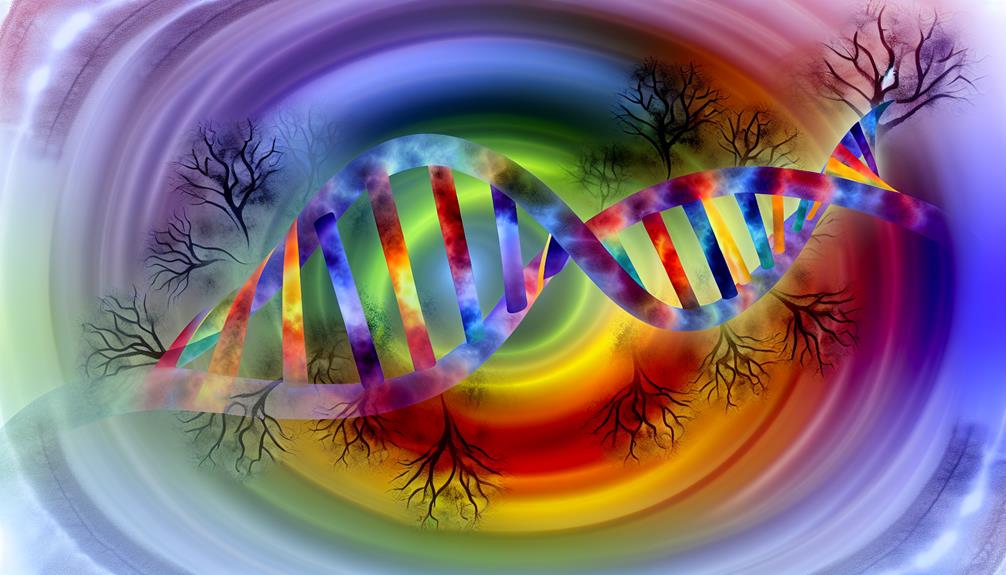When you think about what causes bipolar disorder, it's easy to get lost in the complexity of it all. You might consider genetic factors that suggest a significant hereditary influence, but that's just the beginning. Neurobiological elements like neurotransmitter imbalances play a role, and environmental stressors can trigger episodes in those predisposed. Yet, there's more to this puzzle, including psychological and hormonal factors that intertwine. As you explore these layers, you may find some surprising connections that challenge your understanding of this condition. What else could influence the onset and progression of bipolar disorder?
Contents
- 1 Genetic Factors
- 2 Neurobiological Influences
- 3 Environmental Triggers
- 4 Psychological Aspects
- 5 Hormonal Changes
- 6 Substance Abuse
- 7 Life Stressors
- 8 Frequently Asked Questions
- 8.1 Can Diet Impact the Severity of Bipolar Disorder Symptoms?
- 8.2 Are There Specific Personality Traits Associated With Bipolar Disorder?
- 8.3 How Does Bipolar Disorder Affect Relationships With Family and Friends?
- 8.4 What Are Common Misconceptions About Bipolar Disorder?
- 8.5 Can Early Intervention Improve Long-Term Outcomes for Individuals With Bipolar Disorder?
- 9 Conclusion
Genetic Factors

Over the years, research has increasingly shed light on the genetic factors contributing to bipolar disorder. If you've noticed a family history of mood disorders, you're not alone; familial patterns suggest a strong hereditary component. Twin studies reveal that if one identical twin has bipolar disorder, the other has about a 40% chance of developing it, which highlights the disorder's genetic underpinnings.
Heritability estimates for bipolar disorder range between 60% to 80%, indicating that genetics play a notable role. Researchers have identified several genetic markers associated with the disorder, many of which relate to neurotransmitter genes involved in mood regulation. Specific gene mutations and chromosomal abnormalities have also been implicated, but the exact mechanisms remain complex and multifaceted.
Additionally, epigenetic changes may influence how these genetic factors manifest, interacting with environmental risk factors to trigger the disorder. For instance, stressors might impact gene expression, further complicating the inheritance patterns. While a family history of bipolar disorder increases your risk, it doesn't guarantee you'll develop it.
Ultimately, understanding the genetic factors can provide insight into the disorder's nature. It's important to acknowledge that while your genetics might predispose you, the interplay of various elements, including lifestyle and environment, greatly shapes your experience with bipolar disorder. By recognizing these influences, you can take proactive steps in managing your mental health.
Neurobiological Influences
Neurobiological influences play a vital role in understanding bipolar disorder, as they encompass the brain's structure and function that can affect mood regulation. Research indicates that individuals with bipolar disorder often experience a neurotransmitter imbalance, particularly involving serotonin, dopamine, and norepinephrine. These neurotransmitters are fundamental for maintaining emotional stability, and their dysregulation can lead to the extreme mood swings characteristic of the disorder.
The brain's structure also provides insight into bipolar disorder. Neuroimaging studies have shown alterations in areas such as the prefrontal cortex and amygdala, which are integral to emotional processing and mood regulation. These structural changes may interact with genetic markers, further complicating the neural circuitry involved in this condition.
Additionally, synaptic function and electrical activity within the brain are significant factors. Abnormalities in synaptic transmission can disrupt communication between neurons, contributing to mood instability. Hormonal regulation is another layer of complexity; fluctuations in hormones, such as cortisol, may exacerbate mood episodes.
Understanding these neurobiological influences helps illuminate the intricate interplay between brain chemistry and the symptoms of bipolar disorder. It is important to recognize that these factors are not merely theoretical; they have real implications for those living with the disorder. By delving into these mechanisms, we can better appreciate the biological underpinnings of bipolar disorder, paving the way for more effective treatment approaches and a deeper empathy for individuals maneuvering its challenges.
Environmental Triggers
When considering bipolar disorder, it's essential to recognize how environmental triggers like stressful life events and substance abuse can greatly influence your mental health. These factors can not only exacerbate symptoms but also play a role in the onset of episodes. Understanding these triggers can empower you to develop strategies for managing your condition effectively.
Stressful Life Events
Stressful life events can trigger significant mood changes in individuals with bipolar disorder, often setting off episodes of mania or depression. Your trauma history, lifestyle choices, and personality traits can all influence how you respond to these stressors. Understanding the relationship dynamics and cultural influences surrounding you is essential in managing these challenges.
Developing effective coping mechanisms and enhancing emotional resilience can help mitigate the impact of these stressors. It's also vital to lean on your support systems during difficult times, as they can provide the stability you need.
Here's a quick reference table illustrating some common stressful life events and their potential impact:
| Stressful Life Events | Potential Impact |
|---|---|
| Loss of a loved one | Increased risk of depression |
| Major life changes (e.g., job loss) | Triggering manic episodes |
| Relationship breakdowns | Heightened emotional instability |
| Financial difficulties | Increased anxiety and stress |
Substance Abuse Impact
Substance abuse often exacerbates the challenges faced by individuals with bipolar disorder, greatly affecting their emotional stability and overall well-being. The relationship between substance dependence and bipolar disorder is complex, as both can markedly influence brain chemistry and mood swings. When you engage in substance use, you might find yourself trapped in an addiction cycle that complicates your existing mental health issues.
Consider the following impacts of substance abuse on bipolar disorder:
- Mood swings can intensify, making it harder to manage emotions.
- Withdrawal symptoms may trigger manic or depressive episodes.
- Coping mechanisms may become unhealthy, leading to further reliance on substances.
- Dual diagnosis often occurs, complicating treatment approaches.
- Support systems can weaken as relationships strain under the weight of addiction.
Recovery strategies that integrate both bipolar disorder and substance abuse are essential. Effective treatment approaches should involve thorough support systems that address both conditions simultaneously. By recognizing the impact of substance abuse, you can take vital steps toward healthier coping mechanisms and a more stable emotional landscape.
Psychological Aspects
Understanding the psychological aspects of bipolar disorder involves recognizing how genetic predispositions and environmental stressors can shape your experiences. Research shows that individuals with a family history of mood disorders are at a higher risk, indicating a significant genetic influence. Additionally, the impact of life stressors, such as trauma or major life changes, can trigger episodes, highlighting the complex interplay between biology and environment in your mental health journey.
Genetic Predisposition Factors
While the exact causes of bipolar disorder remain complex and multifaceted, genetic predisposition plays an important role in its development. If you have a family history of bipolar disorder, your risk is heightened due to heritability estimates suggesting that genetics contribute considerably to its onset. Twin studies reveal a remarkable concordance rate among identical twins, indicating a strong genetic influence.
Research in molecular genetics has identified several genetic markers and risk alleles associated with the disorder. However, it's important to understand that genetic factors don't act in isolation. Epigenetic factors—how genes are expressed in response to environmental influences—also play a vital role. Consider the following aspects that highlight this interplay:
- Family history increases risk
- Twin studies show high concordance rates
- Genetic markers identify potential predispositions
- Chromosome variations can indicate underlying issues
- Gene-environment interactions shape individual experiences
Recognizing these genetic predisposition factors can help in understanding your situation or that of a loved one. While genetics provide a foundation, your unique experiences and environment will also considerably influence the course of the disorder.
Environmental Stressors Impact
Environmental stressors profoundly influence the onset and course of bipolar disorder, often acting as catalysts that trigger episodes. When you experience heightened stress from work, relationships, or significant life changes, these factors can exacerbate your symptoms. Research indicates that individuals with bipolar disorder who face social isolation often report more severe mood fluctuations, highlighting the detrimental effects of loneliness.
Childhood trauma, including abuse or neglect, serves as another essential environmental factor. Studies show that early adverse experiences can lead to neurobiological changes, making you more susceptible to developing bipolar disorder later in life. The interplay between these stressors and your mental health is complex; for instance, if you've experienced trauma, you might struggle more with stress management, leading to a higher likelihood of intense mood episodes.
Recognizing these environmental influences is crucial. By understanding how social isolation and past trauma shape your experiences, you can work toward developing effective coping strategies. Engaging in supportive relationships and seeking therapeutic interventions can help mitigate the impacts of these stressors, fostering resilience in your journey with bipolar disorder.
Hormonal Changes

Hormonal changes can considerably influence the mood and behavior of individuals with bipolar disorder. You might be aware that hormonal fluctuations and imbalances can trigger episodes of mania or depression. This relationship is complex, but understanding it can provide insight into your experiences and responses.
Here are some key points to reflect on regarding how hormonal changes affect bipolar disorder:
- Menstrual Cycle: Women may notice mood shifts related to their menstrual cycle, as hormonal changes can exacerbate symptoms.
- Thyroid Hormones: An underactive or overactive thyroid can lead to mood disturbances, complicating bipolar disorder management.
- Stress Hormones: Elevated levels of cortisol during stressful periods can lead to heightened anxiety or depressive episodes.
- Pregnancy and Postpartum: Major hormonal shifts during pregnancy or after childbirth can trigger mood swings and affect stability.
- Aging: Hormonal changes during menopause can also affect mood and may lead to increased mood instability.
Recognizing these patterns can help you and your healthcare provider tailor a more effective treatment plan. It's important to monitor your mood in relation to hormonal changes, as this awareness can empower you to manage your symptoms better. By understanding the impact of hormonal fluctuations and imbalances, you can take proactive steps in your journey with bipolar disorder, fostering a sense of control and stability.
Substance Abuse
Substance abuse is a notable concern for many individuals with bipolar disorder, often exacerbating the severity and frequency of mood episodes. When you struggle with both bipolar disorder and substance use, you may face what's known as a dual diagnosis. This complicates your treatment, as the substance effects can mimic or worsen your mood symptoms, making it hard to distinguish which issue needs immediate attention.
In addiction recovery, understanding the role of substance withdrawal is essential. Withdrawal symptoms can trigger mood instability, leading to a cycle where the need to cope drives you back to substances. Implementing effective coping strategies is important for breaking this cycle. Behavioral therapies can provide you with tools to manage cravings and develop healthier responses to stressors.
Peer influences can also notably impact your journey. Surrounding yourself with supportive peers who encourage sobriety can be crucial in maintaining recovery support. Lifestyle changes, such as regular exercise and a balanced diet, can improve mood stability and reduce cravings.
Fortunately, there are numerous treatment options available that address both bipolar disorder and substance abuse. Integrated approaches, which focus on treating both conditions simultaneously, tend to yield better outcomes. By participating in programs that cater to both your mental health and addiction recovery, you can foster a more thorough healing process. Remember, each step you take towards recovery can lead to a more stable and fulfilling life.
Life Stressors

Life stressors can greatly impact individuals with bipolar disorder, often triggering mood episodes or exacerbating existing symptoms. Understanding how stress interacts with your mental health is vital for managing your condition effectively. Life events—both positive and negative—are significant contributors to emotional regulation challenges.
To navigate these stressors, consider implementing the following coping strategies:
- Mindfulness practices: Engaging in mindfulness can help you stay grounded during stressful times.
- Support systems: Surrounding yourself with understanding friends and family can provide emotional relief and practical help.
- Therapeutic interventions: Regular therapy sessions can equip you with tools to handle stress more effectively.
- Resilience training: Building resilience can empower you to bounce back from setbacks and manage stress better.
- Self-care techniques: Prioritizing self-care is essential; it can enhance your overall well-being and mood stability.
Incorporating lifestyle changes, like regular exercise and a balanced diet, can also play a significant role in stress management. Utilizing community resources that offer support can further bolster your coping mechanisms. Remember, developing emotional regulation skills is a process, and it's okay to seek help along the way. By actively engaging in these strategies, you can build a robust framework for managing life stressors, ultimately leading to improved mental health outcomes.
Frequently Asked Questions
Can Diet Impact the Severity of Bipolar Disorder Symptoms?
Yes, diet can impact bipolar disorder symptoms. Nutritional therapy might aid in mood stabilization, helping you manage fluctuations. Incorporating balanced nutrients could support your overall mental health, fostering a more stable emotional state.
Are There Specific Personality Traits Associated With Bipolar Disorder?
Yes, certain personality types may exhibit traits linked to emotional regulation challenges. Individuals often experience heightened sensitivity, impulsivity, or mood fluctuations, impacting relationships and coping strategies, which can complicate their emotional experiences and overall well-being.
How Does Bipolar Disorder Affect Relationships With Family and Friends?
Bipolar disorder can strain relationships due to communication challenges and emotional volatility. You might find it hard to express feelings, leading to misunderstandings. It's crucial to foster open dialogue and seek support to navigate these complexities together.
What Are Common Misconceptions About Bipolar Disorder?
You might think bipolar myths suggest mood swings are just dramatic behavior, but stigma awareness shows it's a serious mental health condition. Understanding the truth helps reduce misconceptions and fosters empathy towards those affected.
Can Early Intervention Improve Long-Term Outcomes for Individuals With Bipolar Disorder?
Early intervention's like catching a wave before it crashes; an early diagnosis allows you to explore various treatment options. Research shows timely support greatly enhances long-term outcomes, empowering you to navigate life with greater stability.
Conclusion
In understanding bipolar disorder, it's clear that it's not just a single villain in the story; rather, it's a complex interplay of genetics, neurobiology, and environmental factors, much like the layers of an intricate tapestry. Acknowledging these influences can help you navigate the challenges with empathy and insight. By addressing each element—like a skilled conductor orchestrating a symphony—you can work towards a more stable and fulfilling life, despite the unpredictable crescendos of mood.